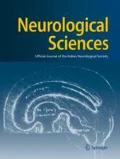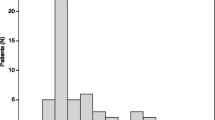Abstract
Hallucinations occur fairly frequently in the course of the pharmacological treatment of Parkinson disease. Our aim in this study was to assess first the relation between hallucinations and mental deterioration and second the correlation between the perception disorder and the profile on the Minnesota Multiphasic Personality Inventory (MMPI). Of 304 parkinsonian subjects followed as outpatients at our center 27 (8.88%) had had hallucinations and 17 of these presented marked cognitive deficits (Mini Mental State <18) (62.9%) compared with 32 of the other 277 patients (11.5%) (X2=55.16, p<0.0001). A group of 9 patients who had had hallucinations and 10 controls who had not, all free from marked cognitive deficits, were assessed on the Luria-Nebraska Neuropsychological Battery (LNNB) and on the MMPI. The two groups did not differ significantly in respect of the LNNB but did in respect of the MMPI scales. On this evidence the frequency of mental deterioration is significantly higher in patients who have hallucinated. We discuss the meaning of the MMPI differences both from the biochemical angle and from that of personality factors. These data suggest that the MMPI might be useful for predicting hallucinations in undeteriorated parkinsonian patients on pharmacological therapy.
Sommario
I fenomeni allucinatori rappresentano un evento piuttosto frequente nel corso del trattamento farmacologico del Morbo di Parkinson. Scopo di questo studio è stato quello di valutare i rapporti esistenti tra allucinazioni e deterioramento mentale e quindi le correlazioni fra tali fenomeni dispercettivi e le caratteristiche del profilo al test MMPI.
In una popolazione di 304 pazienti ambulatoriali affetti da Morbo di Parkinson, seguiti presso il nostro centro, fenomeni allucinatori si erano verificati in 27 soggetti (8,88%). Deficits cognitivi rilevanti (Mini Mental State <18) erano presenti nei 17 dei 27 pazienti con pregresse allucinazioni (62,9%) e nell' 11,5% dei pazienti del resto della popolazione (32 casi su 277) (X2=55.16, p<0.0001).
Un gruppo di 9 paz. con pregresse allucinazioni e di 10 paz. di controllo senza allucinazioni, tutti privi di deficits cognitivi rilevanti, sono inoltre stati valutati mediante una batteria di tests neuropsicologici (Luria-Nebraska Neuropsychological Battery) (LNNB) ed un test di personalità (Minnesota Multiphasic Personality Inventory) (MMPI). A fronte di performances cognitive che non differivano significativamente fra i 2 gruppi, si sono registrate differenze significative nel profilo alle scale del MMPI.
Da questo studio emerge una prevalenza di deterioramento mentale significativamente più elevata nei pazienti con allucinazioni pregresse. Inoltre viene discusso il significato delle differenze al MMPI sia dal punto di vista biochimico che da quello dei fattori di personalità. Questi dati suggeriscono infine il possibile uso del MMPI nei paz. parkinsoniani non deteriorati, come mezzo predittivo di insorgenza di allucinazioni in corso di terapia farmacologica.
Similar content being viewed by others
References
Birkmayer W., Neumayer E.:Die moderne medikamentose Behandlung des Parkinsonismus. Z. Neurol. 202,257–280, 1972.
Boller F., Mizutani T., Roessmann U. et al.:Parkinson's disease, dementia and Alzheimer disease: clinicopathological correlations. Ann Neurol 7,329–355, 1980.
Boller F., Passafiume D., Keefe N.C., et al.:Visuospatial impairment in Parkinson's disease: role of perceptual and motor factors. Arch Neurol, Chicago, 41,485–490, 1984.
Casacchia M., Meco G., Corona R., Cappellini R.:Gli effetti psichiatrici durante la terapia del morbo di Parkinson. Considerazioni cliniche e prospettive terapeutiche. Atti IV Riunione L.I.M.P.E., (Cagliari 1977), A. Agnoli and G. Bertolani Eds., Publ. “Don Guanella”, Roma 1978, pp. 209–219.
Celesia G.G., Barr A.N.:Psychosis and other psychiatric manifestations of levodopa therapy. Arch Neurol 23,193–200, 1970.
Critchley P., Perez F.G., Quinn N., Coleman R., Parkers D., Marsden C.D.:Psychosis and lisuride pump. Lancet II 349, 1986.
Dahlstrom W.G.G., Welsh G.S., Dahlstrom O.E.:An MMPI handbook. Vol. 10: Clinical Interpretation. University of Minnesota Press, Minneapolis, 1972.
De Smet Y., Ruberg M., Serdaru M. et al:Confusion, dementia and anticholinergics in Parkinson's disease. J Neurol Neurosurg Psychiatry 45,1161–1164, 1982.
Dubois B., Danze' F., Pillon B., Cusimano G. et al:Cholinergic-dependent cognitive deficits in Parkinson's disease. Ann Neurol 22,26–30, 1987.
Flowers K.A., Pearce I., Pearce J.M.S.:Recognition memory in Parkinson's disease. J Neurol Neurosurg Psychiatry 47,1174–1181, 1984.
Flowers K.A., Robertson C.:The effect of Parkinson's disease on the ability to maintain a mental set. J Neurol Neurosurg Psychiatry 48,517–529, 1985.
Folstein M.F., Folstein S.E., McHugh P.R.:“Mini Mental State”. A practical method for grading the cognitive state of patients for the clinical. J Psych Res 12, 189–198, 1975.
Glantz R.H., Bieliauskas L., Paleologos N.:Behavioral indicators of hallucinosis in Levodopatreated Parkinson's disease. Adv Neurol 45,417–420, 1986.
Golden C.J., Hammeke T.A., Purisch A.D.:The Luria-Nebraska Battery manual. Western Psychological Services, Los Angeles, 1980.
Hakim A.M., Mathieson G.:Dementia in Parkinson's disease: a neuropathological study. Neurology 29,1209–1214, 1979.
Hachinski V.C., Iliff L.D., Zilhka E. et al:Cerebral blood flow in dementia. Arch Neurol 32,632–637, 1975.
Matison R., Mayeux R., Roses J. et al:“Tip-of-the-tongue” phenomenon in Parkinson's disease. Neurology, New York, 32,567–570, 1982.
Moskovitz C., Hamilton M., Klawans H.D.:Levodopa induced psychosis: a kindling phenomenon. Am J Psychiatry 135,6,669–675, 1978.
Presthus J.:Psychiatric side-effects occurring in Parkinsonism during long-term treatment with Levodopa alone and in combination with other drugs. In: Parkison's disease — Current Progress, Problems and Management, pp. 255–270, Elsevier/North Holland Biomedical Press, 1980.
Pederzoli M., Girotti F., Scigliano G., Aiello G., Carella F., Caraceni T.:L-Dopa long-term treatment in Parkinson's disease: age-related side-effects. Neurology 33,1518–1522, 1983.
Rondot P., de Recondo J., Coignet A., Ziegler M.:Mental disorders in Parkinson's disease after treatment with L-Dopa. Adv Neurol 40,259–269, 1984.
Ruggieri S., Stocchi F., Agnoli A.:Lisuride infusion pump for Parkinson's disease. Lancet II 348–349, 1986.
Sweet R.D., McDowell F.H., Feigenson J.S., Loranger A.W., Goodell H.:Mental symptoms in Parkinson's disease during chronic treatment with levodopa. Neurology 26,305–310, 1976.
Tanner C.M., Vogel C., Goetz C.G. et al:Hallucinations in Parkinson's disease: a population study. Ann Neurol 14,1,136, 1983.
Todes C.J., Lees A.J.:The pre-morbid personality of patients with Parkinson's disease. J Neurol Neurosurg Psychiatry 48,97–100, 1985.
Webster D.D.:Clinical analysis of the disability in Parkinson's disease. Med Treat 5,257–282, 1968.
Wilson R.S., Tanner C.M., Weingarten R., Goetz C.G.:Hallucinosis in Parkinson's disease. Neurology 36, (Suppl. 1) 216, 1986.
Author information
Authors and Affiliations
Rights and permissions
About this article
Cite this article
Meco, G., Bonifati, V., Cusimano, G. et al. Hallucinations in parkinson disease: Neuropsychological study. Ital J Neuro Sci 11, 373–379 (1990). https://doi.org/10.1007/BF02335940
Received:
Accepted:
Issue Date:
DOI: https://doi.org/10.1007/BF02335940




